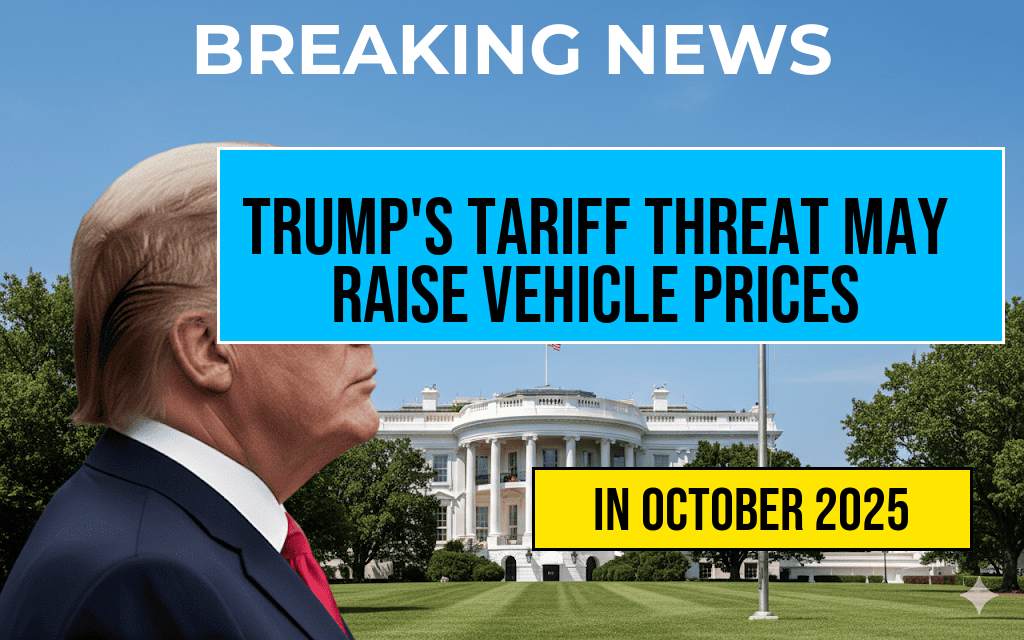Former President Donald Trump has reignited discussions around tariffs that could significantly impact the automotive industry, with estimates suggesting that vehicle prices might rise by as much as $5,286. This potential increase stems from his proposal to impose tariffs on imported vehicles and parts, a move that has raised concerns among manufacturers, consumers, and economic analysts alike. The looming tariff threat not only threatens to inflate car prices but also risks disrupting the already fragile supply chains that have been grappling with various challenges in recent years. As the automotive market continues to recover from the pandemic and semiconductor shortages, the implications of such tariffs could reverberate through the economy, affecting everything from consumer spending to manufacturing jobs.
Understanding the Tariff Proposal
Trump’s latest tariff threat is reminiscent of his previous trade policies, which aimed to prioritize American manufacturing by imposing taxes on foreign imports. The proposed tariffs would primarily target vehicles manufactured outside the United States, making them less competitive compared to domestic counterparts. Experts warn that such tariffs could lead to higher costs for consumers, particularly in an industry already facing supply chain disruptions.
Impact on Vehicle Prices
According to a report by the Forbes, the average increase in vehicle prices due to these proposed tariffs could be substantial, with estimates ranging from $1,000 to as much as $5,286 depending on the vehicle type and manufacturer. This price hike could impact not only new car buyers but also the used car market, as higher new car prices typically lead to increased demand for used vehicles.
Consequences for Consumers and Manufacturers
- Consumer Burden: The proposed tariffs could lead to higher monthly payments for car buyers, affecting affordability in an already challenging economic climate.
- Manufacturer Challenges: Automakers may face increased production costs, which could lead to layoffs or reduced hiring as companies adjust to the financial strain.
- Supply Chain Disruption: Tariffs could exacerbate existing supply chain issues, especially regarding the availability of parts required for vehicle assembly.
Expert Opinions on Tariffs
Economists and industry experts have varied opinions on the potential effects of Trump’s tariff threats. Some argue that while the tariffs may protect domestic jobs in the short term, they could hurt the broader economy by increasing consumer prices and reducing overall vehicle sales. Other analysts suggest that the tariffs might lead to retaliatory measures from other countries, further complicating international trade relations.
Potential for Retaliation
Countries that export vehicles to the United States may respond with their own tariffs, impacting American goods. This could create a cycle of trade disputes, ultimately hurting American consumers and businesses alike. For instance, if European manufacturers increase prices on American exports, it could lead to a significant decline in U.S. exports, affecting the trade balance.
The Big Picture
As the automotive landscape evolves, the implications of Trump’s tariff threats could reshape the market. Manufacturers are already adapting to a post-pandemic world, grappling with supply chain issues and changing consumer preferences. The introduction of tariffs may lead to a reevaluation of pricing strategies and production locations, as companies seek to mitigate increased costs.
Looking Ahead
The automotive industry is at a crossroads, with electric vehicles (EVs) gaining traction and traditional gas-powered vehicles facing scrutiny. Tariffs on imports could further complicate this transition, as manufacturers may struggle to balance production costs with the need to innovate and meet consumer demand for sustainable options.
Conclusion
The potential for tariffs on imported vehicles presents a complex challenge for the automotive industry and consumers alike. As stakeholders navigate the implications of these proposed tariffs, the focus will remain on balancing domestic manufacturing interests with the economic realities facing consumers in an evolving marketplace.
Frequently Asked Questions
What are the potential impacts of Trump’s tariff threat on vehicle prices?
The tariff threat from Trump could lead to an increase in vehicle prices by as much as $5,286, significantly affecting consumers and the automotive industry.
How does the tariff affect the cost of manufacturing vehicles?
The tariff may increase the cost of imported materials and components used in vehicle manufacturing, which can subsequently raise the overall retail price of vehicles.
Which vehicles are likely to see the largest price increases?
Luxury and imported vehicles are expected to experience the largest price increases due to the tariff, while domestic models may also face some upward pressure on prices.
How might consumers respond to rising vehicle prices due to tariffs?
As vehicle prices rise due to the tariff, consumers may delay purchases, opt for less expensive models, or seek alternative transportation options.
What are the long-term implications of tariffs on the automotive market?
In the long term, tariffs could lead to reduced competition, higher prices, and potential job losses in the automotive sector, ultimately affecting the overall economy.

Leave a Reply